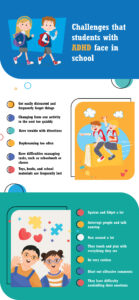What is a school nurse’s role in aiding students with ADHD?
ADHD is a behavioral disorder that affects one in every twenty children in the United States, with around 80% of adolescents experiencing symptoms throughout adolescence and into adulthood.
Children with attention deficit disorders exhibit symptoms such as impulsivity and hyperactivity, which affect their academic and behavioral performance at school and at home.

School nurses can play an important role in raising awareness of ADHD by improving the service delivery model for distressed children and their families.
In this blog, we will learn how school nurses help students with ADHD, and how they help parents of both affected and non-affected students in empowering themselves and their children to live a quality life.
ADHD in students, and what challenges they may face at school
Children with attention deficit or hyperactivity disorder have even more personal struggles than average students. They typically exhibit symptoms such as inability to pay attention, difficulty controlling impulses, and difficulty sitting still, such conditions cause students to perform poorly at school.
Around 5% to 9% of children aged 9 to 17 have serious behavioral problems that hinder their ability to function at home, school, or in the community. ADHD is one of these concerns.

To educate such students, schools must implement measures that will support their treatments while still allowing them to learn with their classmates.
How can schools support ADHD students?
- ADHD treatments in schools usually involve behavioral classroom management and organizational training.
- Students with disabilities receive special education programs in schools.
- Schools are also taking the necessary steps to limit the effects of ADHD on their learning.
The Role of the school nurse in helping children with ADHD
School nurses are the main care providers in schools and provide primary prevention for students who show symptoms of ADHD. They play an important role in raising awareness of ADHD by enhancing the health service delivery model for afflicted children and families.
School nurses perform as ADHD educators for families and their children who are affected by the condition. They encourage families to seek therapy for their children at healthcare institutions since most parents are scared that their children will be labeled and stigmatized because of their child’s mental health issues and need for treatment.
School nurses create and implement programs and workshops to fight the stigma associated with ADHD and raise awareness about child behavioral programs. They also develop culturally relevant methods to care for affected children and provide support, education, and information to families, children, and communities.
They also collaborate with other health care providers to initiate national screening programs for identifying behavioral issues in children and ADHD in school-age and younger children. Children who show symptoms of ADHD are subsequently evaluated individually and clinically by skilled, highly trained professionals in this field.
If a child is diagnosed with symptoms of ADHD, the school nurse can assist in implementing the following framework in school and at home to ensure better care for them.
1. Accepting a child as an equal and interacting with him based on his current level of functioning:
It will help the child grow milder, allowing him to express his thoughts and emotions and helping him to respond more properly considering his condition.
2. Using clear and simple instructions
Repeating instructions several times and using visual aids and images can improve a child’s learning. Such short lessons will benefit the child’s education and help him adjust better in school, despite his short attention span.
3. Implementing a daily routine schedule
Repeating the exercises in a regular and ritualistic manner will improve his individuality and responsiveness to learning.
4. Creating a non-distractive environment for the child
Setting a quiet and non-distractive environment at schools will prevent the child from being hyperactive and distractive.
5. Encourage the child positively and allow him to do physical activities
Giving him rewards and praise for reaching a goal can help encourage him while decreasing his tolerance and impatience. Encouraging the kid to participate in physical activities can also help him expend his energy productively and get a good night’s sleep.
6. Educate families to take better care of ADHD students at home
School nurses also help families in gaining information about home care instructions for students with ADHD. It involves helping the child to develop a sense of belonging and appreciation for his or her efforts. Promoting a student’s academic success will help the child’s social, academic, and personal development.
Additionally, preparing the child to develop patience, creative thinking, and persistence will help him to learn new skills and accomplish tasks at home and at school.
Final thoughts on school nurses caring for ADHD students
School nurses must play an important part in raising awareness of ADHD by improving the health service delivery model for affected children and their families. Through research, workshops, community activities, and national screening programs, they can build on a solid foundation of analysis to improve the benefits.
Students who are diagnosed with ADHD need medicines to help them learn, focus and stay calm in class. A school nurse must maintain contact with the student’s doctor and keep a close eye on the child while he or she is taking medication. Another important aspect of their treatment is behavior therapy, which helps the child to do better at home and school.
A comprehensive school health tracker platform, like EduHealth, will help school nurses in conducting their regular school health responsibilities while also accurately managing the medications and therapy of ADHD students. EduHealth also has functionalities for tracking hospital visits, treatment charting, and doctor appointments.
It also records health screening information in pre-built forms and has effective tracking systems for notifying and monitoring medicine treatments. School nurses can use the EduHealth school EHR system’s features to provide better health care for students at school. Learn more about our school health care system here.








